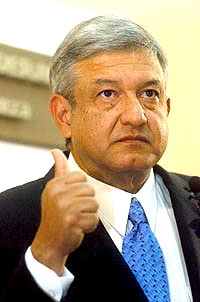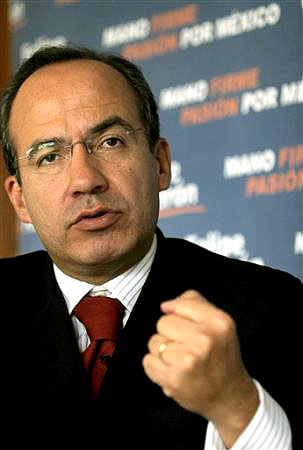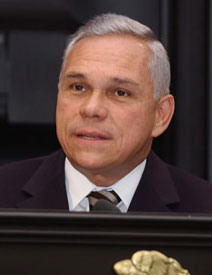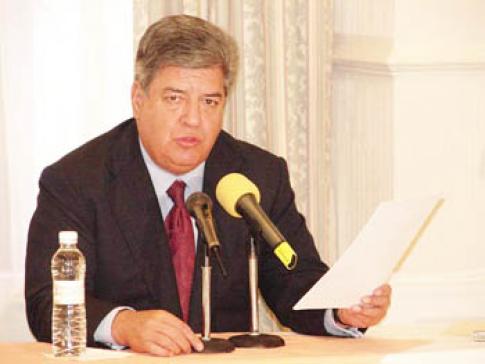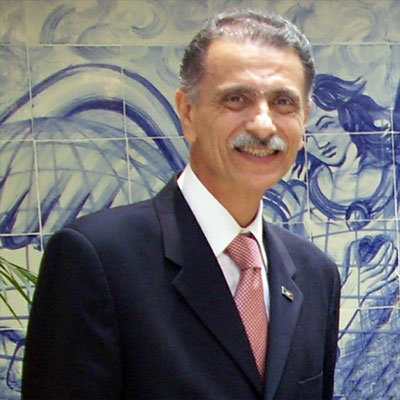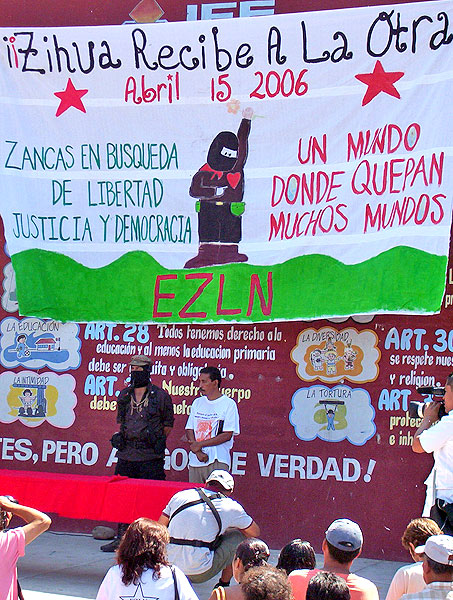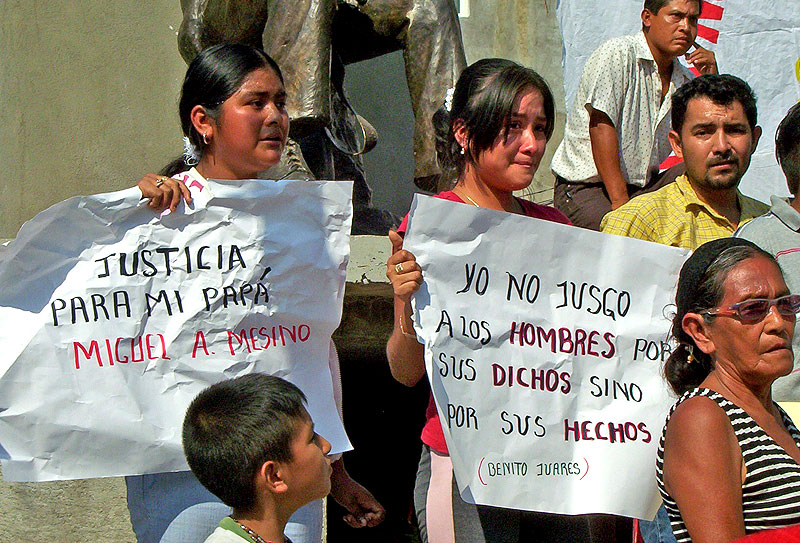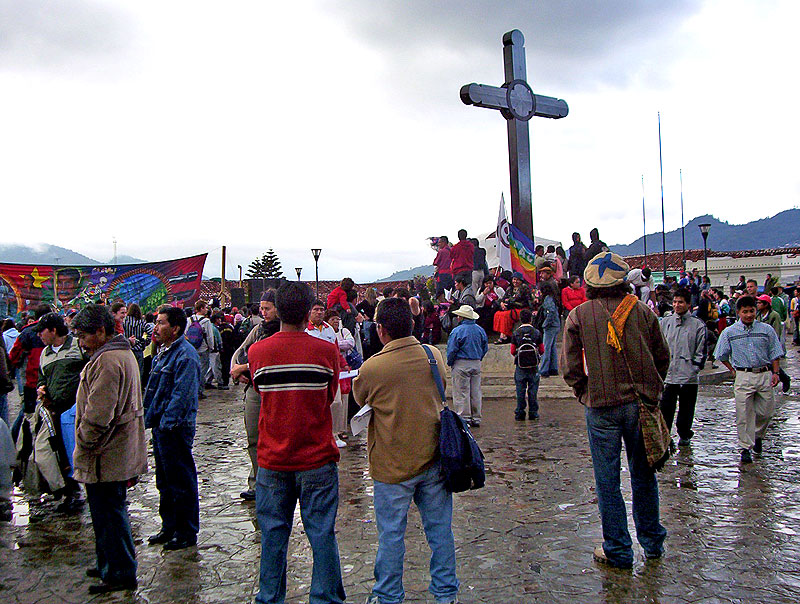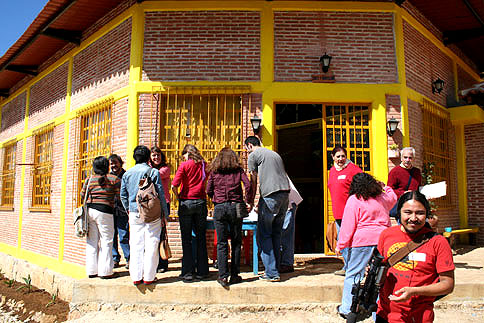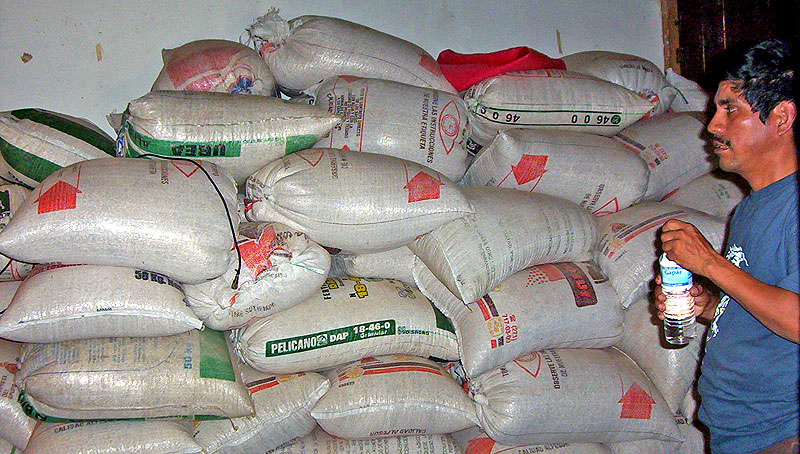SIPAZ Activities (October 2005 – January 15, 2006)
31/01/2006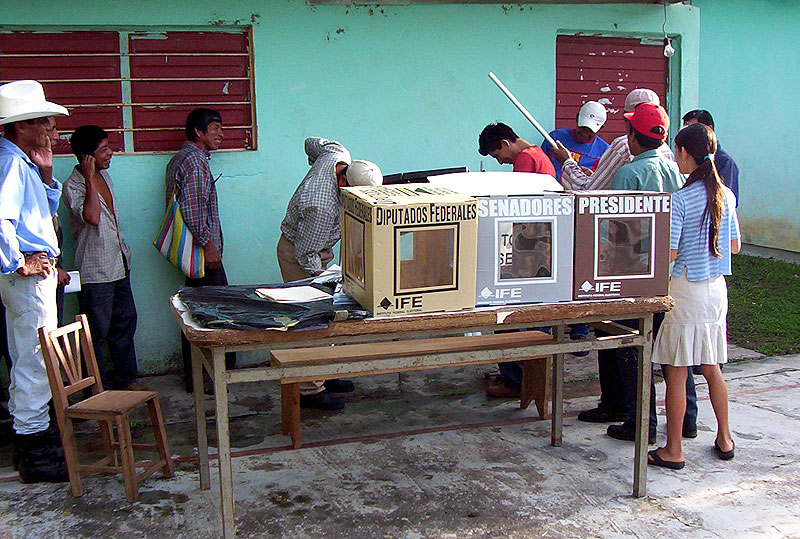
ANALYSIS: Mexico – Post-Election Uncertainties
31/07/2006Presidential Elections: At the Climax of the Battle
On July 2 the Mexican Presidential Elections will be held. For several months now, the main political parties have been campaigning, defending their respective candidates:
- Roberto Madrazo, representing the Alliance for Mexico, which includes the Institutional Revolutionary Party (PRI- which was in power for 70 years until the 2000 election) and the Ecological Green Party of Mexico (PVEM).
- Andrés Manuel López Obrador, representing the Alliance for the Good of Everyone, which includes several center and left parties: Democratic Revolution Party (PRD), Convergence, and the Labor Party (PT).
- Felipe Calderón, for the National Action Party (PAN, the current party in power).
- Roberto Campa, for the New Alliance (a recently formed party, an offshoot of the PRI, supported by the National Union of Education Workers).
- Patricia Mercado, for the Social-Democratic and Campesino Alternative, another recently formed party made up of various political movements.
Since the start of the campaigns, it has been clear that the true competition would be between the first three candidates on the list. Andrés Manuel López Obrador is the best situated of the three, though his advantage over the other candidates has been diminishing as the campaigns advance. After him, Felipe Calderón and Robert Madrazo follow in that order.
On March 12, local elections were held in the State of Mexico for 125 city governments and the local Congress. Generally, this political process is used as a sort of gauge for the presidential elections. Nevertheless, this process illustrated, more than anything else, the volatility of the Mexican electorate: 76 of the 125 city governments changed parties. The PRD was the main victor of the day, with 37% of votes (compared to 33% for the PRI). Eight months after winning, by a wide margin, the election for governor of the State of Mexico, the PRI saw its percentage of voting decline by 14.5 points. One possible explanation is the recent bout of scandals involving, on one hand, the Governor of Puebla, Mario Marín, and on the other hand, Arturo Montiel, presidential pre-candidate for the PRI, who, as a result, withdrew his candidacy (see the previous SIPAZ Report). The PAN maintained a stable voting percentage.
In the federal competition, it has come into question whether the presidential campaigns are more centered on verbal attacks and mutual disqualification than on genuine debates of clearly defined proposals. While some analysts consider the most likely outcome a victory for Andrés Manuel López Obrador, as the polls are also predicting, there is still a high percentage of undecided voters. The “abstentionism” factor could also be an element that affects the final results. In a scenario of low voter turnout, the hard-core vote of the PRI could give them the advantage. While on the other hand, in more than half of the states of Mexico, the PRD does not exceed 10% of the total voting in any type of election. Certainly, as was seen in the elections in the State of Mexico, the “hard core vote” of the PRI has been increasingly eroded by internal divisions and desertions, the most notable being Elba Esther Gordillo, the former party secretary.
State Elections: Blurry Lines and Power Games
In addition to the federal elections to be held on July 2nd (for President, Senators, and Deputies), in Chiapas, on August 20th, there will also be elections for state Governor. Until recently, it was assumed that the PRI would triumph without great difficulty, since no coalition of other parties was formed in opposition.
Nevertheless, the context has become more complex with changes and ruptures that were not foreseen initially. Even more so than at the national level, the PRI is divided following a decision made by the party at the national level, and later ratified, which named the current senator, José Antonio Aguilar Bodegas, as the candidate for Governor of Chiapas.
Roberto Albores Guillén (interim governor of Chiapas from 1998-2000) took advantage of support form the majority of the PRI electorate in his attempts to present himself for candidacy, started a movement of resistance and consultation of citizens with regards to the structure for the selection of candidates of the state government. Albores affirmed in the press that José Antonio Aguilar Bodegas was elected as the “candidate of unity” in a process that was “antidemocratic, representing a return to the old PRI, a feared, authoritarian party, linked to its prejudices and political fears.” If it comes through, this rupture could affect not only the electoral context, but could also bring about broader consequences along the way.
At the end of April, the municipal president of Tuxtla Gutiérrez, Juan Sabines Guerrero, announced his resignation to the PRI. A few days later he was named as candidate for the PRD with 159 votes in his favor (221 of the current 278 existing states councilors attended the meeting). This movement could further divide the PRI electorate. In announcing his resignation, Juan Sabines affirmed: “I am separating myself from the leadership of the party and from the party, but I will never separate myself from the PRI supporters of Chiapas, which are its strength, its base, its support. I invite them all to accompany me in the construction of a new project where we can all fit and where doors are not closed the way they were by the leaders yesterday, Monday, in the State Political Council” [referring to the meeting in which Aguilar Bodegas was selected as candidate].
The federal deputy Emilio Zebadúa (secretary of the government of Pablo Salazar Mediguchía, the current governor, in the first two years of his administration, who has publicly expressed his disagreement with the internal state process of the PRD and with Pablo Salazar) has announced that he will challenge the process.
The Conflict in Chiapas: A Relegated Issue in the Political Agenda
The unresolved armed conflict is not an issue of high priority in the electoral agenda. Nevertheless, various candidates have made reference to the San Andrés Accords, signed in 1996 by the federal government and the Zapatista Army of National Liberation (EZLN), particularly in the context of campaign visits to the state.
A number of recent declarations made by the Executive are also of interest in the following sense: in February, the commissioner for peace in Chiapas, Luís H. Álvarez, affirmed that the EZLN no longer exists as a group; and that Subcomandante Marcos is seeking to “oxygenate the movement that had its time and place” with the Other Campaign.
In March, the secretary of government, Carlos Abascal Carranza, met with the legislators that form the Commission of Concordance and Pacification (COCOPA, the commission created to carry out the dialogues between the government and the Zapatistas). He affirmed that “other than the circumstances of exception in Chiapas, the area referred to as the ‘grey zone’ has ceased to exist.” He announced that the Federal Army is only working in Chiapas around issues relevant to its position as a border state.
From Aguascalientes, Subcomandante Marcos refuted these statements affirming: “The Federal Army maintains its invasion of indigenous communities, not only those that are Zapatistas, throughout the state of Chiapas. (…) The Federal Army has not withdrawn from the state of Chiapas, or the zone of conflict, it has simply withdrawn from a few areas in order to strengthen its position in other areas, specifically Las Cañadas and the Highlands of Chiapas.”
Various civil organizations with a broad trajectory in Chiapas also issued statements regarding these claims. For example, the Center of Political and Economic Research and Community Action (CIEPAC) stated: “During Vicente Fox’s administration, a total of 53 military positions and 17 Sectorial Police positions have been withdrawn (…), but those spaces have been covered by the presence of other police groups and new forms of vigilance have been developed, contracting people from indigenous communities who are now informants for the National Investigation and Security Center (CISEN). Furthermore, following the military withdrawals, members of the military intelligence return to the communities in civilian dress and they stay in the homes of PRI-supporters to observe, watch, and report the actions of Zapatistas.”
The Center for Political Analysis and Social and Economic Research A.C. (CAPISE) affirmed that: “The Seceretary Carlos Abascal lacks the truth. (…) Up until last February, this Center identified 97 permanent military positions (camps) in the state of Chiapas (only those camps that have been physically verified are counted). Of the 97 identified camps, 73 are located in clearly indigenous territory, that is to say, 75% of the military occupation in the state of Chiapas is in territory of Zapatista influence.”
CAPISE also made reference to another part of the statement made by the Secretary of Government: “…the tour that is currently being carried out by the EZLN throughout the nation, is being done in the context of full respect, from the Federal Government, for free speech by organizations and movements that form the national political mosaic.” At the end of March, CAPISE had documented 82 cases of aggressions against adherents to the Other Campaign in 15 states of Mexico.
In the case of Chiapas, the Fray Bartolomé de Las Casas Human Rights Center has reported 14 cases of harassment and intimidation of human rights defenders between November 2005 and March 2006 (see summary).
… … … … … …
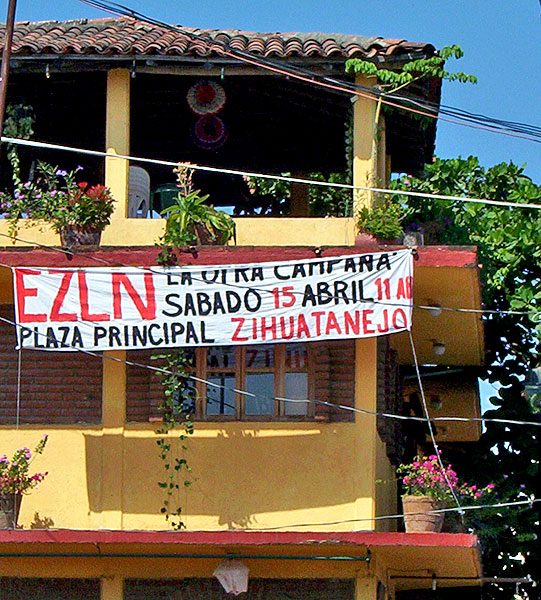 © SIPAZ
© SIPAZ
Parallel to the context of the electoral campaigns, the EZLN continues to promote the initiative of the “Other Campaign,” a process that, in the words of the EZLN: “is long term and at the margin of the electoral process” seeking “the construction of another form of politics, of a national, leftist struggle, for a new Constitution” (Sixth Declaration of the Selva Lacandona). From January to June, the Subcomandante Marcos, now renamed the Subdelegate Zero, is touring all the states of Mexico. At the end of April, he had passed through Chiapas, Quintana Roo, Yucatán, Tabasco, Campeche, Veracruz, Oaxaca, Puebla, Tlaxcala, Hidalgo, Querétaro, Guanajuato, Aguascalientes, Jalisco, Colima, Nayarit, Michoacán, Morelos, Guerrero and the State of Mexico (for more information see Enlace Zapatista).
On February 19, in the context of the Meeting of Other Communication, Other Information, Other Culture, and Other Art held in the indigenous community of Zacatelco, Tlaxcala, the Subdelegate Zero explained, once again, the objective of this first tour: “instead of listening to those from above, those from below have chosen to listen to each other. Above, a transitory scene. Below, an incomplete heart and growing indignation, looking for the steps, the path, the direction and the destination.”
In the face of the informational void of the majority of the major media, the Subdelegate Zero has, on more than one occasion, had to explain what the Other Campaign is and what it isn’t. The movement has been accused of calling for absenteeism when they have explicitly said that it is not abstentionist. For example, in February, in Puebla, Marcos explained: “We have never asked people not to vote and we aren’t doing that now. We are inviting you to look in a new direction, not towards above; that you exercise your intelligence and your dignity, that you think about what those from above are offering and what is happening here, below, and with that in your mind and your heart you decide to vote or not on July 2nd.”
The Other Campaign is also accused of playing for the right by dividing the leftist movements and seriously questioning Andrés Manuel López Obrador, when he has a real chance of winning the Presidency. Some have questions the very idea of a “union of the left”: “The division of the left and especially the division between party and movements is a tendency that frames a systemic crisis in forms of selecting representation and the gradual and progressive decomposition of the political classes practically throughout the world” (CIEPAC – Boletín “Chiapas al Día” No. 504). Whether or not you agree with this position, it is important to also signal that no member of the political class –left or right- has been spared the severe critique of the Subdelegate Zero.
A final question for the Other Campaign is regarding the absence of concrete proposals for the problems that afflict the country. It seems that what is expected of the Other Campaign are programmed proposals in the vein of what the candidates could be addressing. Nevertheless, as Marcos explained in Campeche in January, it is more about the collective construction of “new structures of power that work for the good of the marginalized and which will promote regional accords which can then be converted into a National Plan of Struggle.”
CIVIL SOCIETY: Gatherings
In March, the fourth World Water Forum was held in Mexico City, with 148 countries represented. At the same time, activists from social movements, non-governmental organizations, and international networks met, all of who work in the defense of water, of territory and of communal land. At the end of the gathering, the following three points were emphasized:
“1. Water is not merchandise. For this reason we reject all forms of privatization, including the public-private association that has proved to be a total failure all over the planet.
2. The administration and control should remain within a sphere that includes the public, social, community needs and interest, through a participative form with equality and without profit.
3. Solidarity between present and future generations should be guaranteed, and for this reason we reject the development, neo-liberal, consumerist model that promotes the overexploitation of the mother nature.”
On March 10, 11, and 12th, a statewide meeting was held against PROCEDE (Program of Certification of Parcel and Titleling Rights of Urban Lands) and PROCEDECOM (Program of Certification of Communal Rights) in Petalcingo, in the municipality of Tila. More than 600 people from different social organizations in Chiapas participated. The objective of this meeting was to share the situations of different ejido and communal lands affected by these programs, as well as alternatives to halt them. Manuel Cruz, of the organization Yomblej, in the municipality of Chilón, explained in an interview: “consciousness-raising about this problem that we encounter in our ejidos and communities is very important, because if not we will lose our land. Accepting PROCEDE is a betrayal of the land, of life and of ourselves.”
In March, members of various civil and social organizations, and adherents of the Other Campaign held a march and rally in San Cristóbal de Las Casas to protest against persecution by the police and the abuse of authority by state and municipal governments. On April 9 and 10th, a State-wide Meeting Against Repression was held, with 144 participants from 21 municipalities throughout the state. They denounced “aggressions and repression because of the resistance to paying overpriced power bills, for not wanting to join PROCEDE which deprives us of the land, for rejecting the privatization of water, for continuing to be fishermen, for demanding better conditions for prisoners who are forced to live in inhumane conditions, for the liberation of thought and expression, for the liberty of our brothers and sisters being held as political prisoners, against the use of the judicial system to persecute social activists, the excessive use of public force in the taking of land, the negation of women’s rights to land, and many other ways used by the state and federal governments and the groups in power in our regions.”

